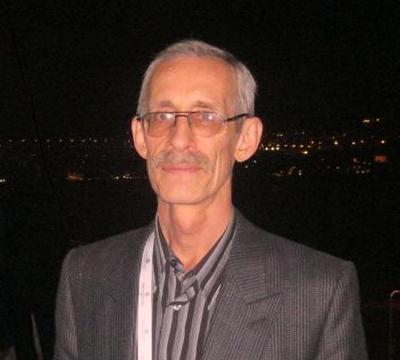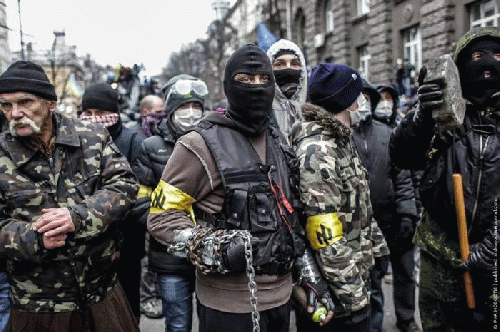The collapse of authority in Ukraine led to what appears to be the breakaway of an already autonomous Crimea, now to be aligned with Russia. The frigate Hetman Sahaydachniy (the flagship of the Ukrainian Navy), on NATO maneuvers in the Gulf of Aden, refused to take orders from Kiev and raised the Russian naval flag as it returned to Simferopol. Simultaneously, Russian troops blocked three Crimean bases, demanding Ukrainian forces surrender. Residents have announced they are going to hold a referendum on 30 March to determine the fate of Crimea.
High ranking Ukrainian military and security officials swore their allegiance to the Autonomous Republic of Crimea, rejecting the new government in Kiev as illegitimate. Acting Ukrainian President Oleksandr Turchynov dismissed his newly appointed Navy commander Denis Berezovsky when he took the oath of allegiance to "Crimean people", accusing him of treason. "This is actually a declaration of war to my country," exclaimed the outraged Ukrainian interim PM Arseniy Yatsenyuk. Oh really? Is this a case of Russian aggression, or the new humanitarian justification for intervention R2P (right to protect)? Or is it something much simpler?
Russia modern, Ukraine postmodern
The post-Soviet New World Order that the West is trying to impose in Afghanistan, Iraq, Egypt, Ukraine, etc. requires obedient "postmodern states", open to "free trade" (in US dollars) and "free" elections (preferably with short terms making for weak presidents), the whole process monitored by a "free" media (read: privately controlled) and western NGOs. It's a very expensive racket--the winner is generally the best-funded and most widely advertised in the "free" media. Sometimes it's even a military dictator, as long as he can arrange to be elected.
Occasionally things go awry--a populist like Venezuela's Hugo Chavez gets elected and re-re-elected, and must be subverted through media and NGO targeting, or a country like Iran opts out of the whole circus and survives to tell the tale. But the immense power and prestige of the empire usually asserts itself after chipping away at the offender long enough to bring the renegade's supporters to their knees.
However, this scenario is still not the order of the day when it comes to Russia. "Foul!" cry President Obama and western politicians, unanimously buttressed by screaming media headlines, at various anti-empire moves by the Russian bear. This is the case now, with Russia's move to fill the dangerous vacuum in Ukraine and assure its continued control of the strategic Crimean peninsula, which has for centuries been Russia's main Black Sea outlet and is populated largely by Russians.
Ukraine has always been Russia's twin. Long ago it was the elder twin, as in Kievan Rus, the federation of Belarus, Ukraine, and Russia in the 9th--13th cc. The next seven centuries were messy ones, with the Tatar invasions, and Poland and Russia battling it out on the Ukraine's fertile black earth. Catherine the Great put an end to the Cossack "Ukraine' in 1764 (and to the Crimean Khanate in 1776), though it could hardly be called a state. "Ukraine' can really only claim "independence' as a modern state for a few months following the collapse of the Russian Empire in 1917. In the Polish-Soviet Peace of Riga in 1921, it was shorn of its western and northern regions to Poland and Russia, and became a Soviet republic.
Ukraine's very spotty experience as an state since is hardly much better--Stalin's reincorporation of a very unreceptive western Ukraine following WWII, and Khrushchev's thoughtless gift of Crimea in 1954, when Soviet borders were of no importance. The "independence' "won' in 1991, when Soviet-era leaders in Ukraine, Belarus and Russia secretly agreed to abandon the Soviet Union, precipitating its collapse, was a faux independence within the US-dominated "peaceful' world order.
This finally reached a breaking point when President Yankovitch was given an ultimatum by the EU last year. The choice was to submit to the EU proposed association agreement (and face drastic disruption to its economic relations with Russia), or reestablish itself as part of the Russian "near abroad', now being reorganized as a Eurasian customs union (where it would arguably have more real "independence' than it would under the EU's highly integrated economic, political and legal system).
EU accession--as a prelude to NATO membership--is vital to securing the rather shaky empire, which has recently suffered a string of debacles, notably in the Muslim world. The problem is that Ukrainians are evenly split on the EU vs Russia as chief partner. A Johns Hopkins Center for Transatlantic Relations study concluded, "The main obstacle" to Ukraine's joining the organization "is not Russian opposition but low public support for membership in Ukraine itself."
Freedom and Fatherland
So to overcome this hurdle, a coalition that would embrace right wing nationalists and Europhiles was necessary to defeat the pro-Russians, a repeat of the 2004 color revolution that brought the Europhiles to power but left Ukraine in even worse shape than it was. And because a repeat performance of 2004 would not get the same response from a jaded populus, it was necessary to allow the neo-Nazis to be at the forefront of the resistance, given their enthusiasm for violent confrontation in the name of the fatherland. Ironically, they gather under the misnomer Freedom Party, while their Europhile allies-of-convenience (ex-PM Tymoshenko and current PM Yatsenyuk) gather under the equally misnamed Fatherland Party.
Neofascists and neoliberals are joined in an unholy alliance for "freedom' and "fatherland' against a weak, waffling government less pretentiously merely trying to placate conflicting groups, with the US finding itself on the side of the neofascists. Does this sound like Egypt, Syria, Libya? Writes Israel Shamir, "Liberals do not have to support democracy. They can join forces with al-Qaeda as now in Syria, with Islamic extremists as in Libya, with the army as in Egypt, or with neo-Nazis, as now in Russia and the Ukraine."
Even if we could believe the opposition's rousing rhetoric of "freedom' and "fatherland', there is no room anymore for either in the empire. EU President Herman Van Rompuy confirmed this when he said that "the time of the homogenous nation state is over. The belief that countries can stand alone is a lie and an illusion."
Belarus (or Belorussia, meaning white Russia) under its stern populist Alexandr Lukashenko realized the illusory nature of the Euro offerings long ago, negotiating an unprecedented voluntary commonwealth with Russia in 1996, though putting the Eurasian Humpty Dumpty together again is proving to be as hard as the fairytale suggests, even for the stalwart Lukashenko.
(Note: You can view every article as one long page if you sign up as an Advocate Member, or higher).






